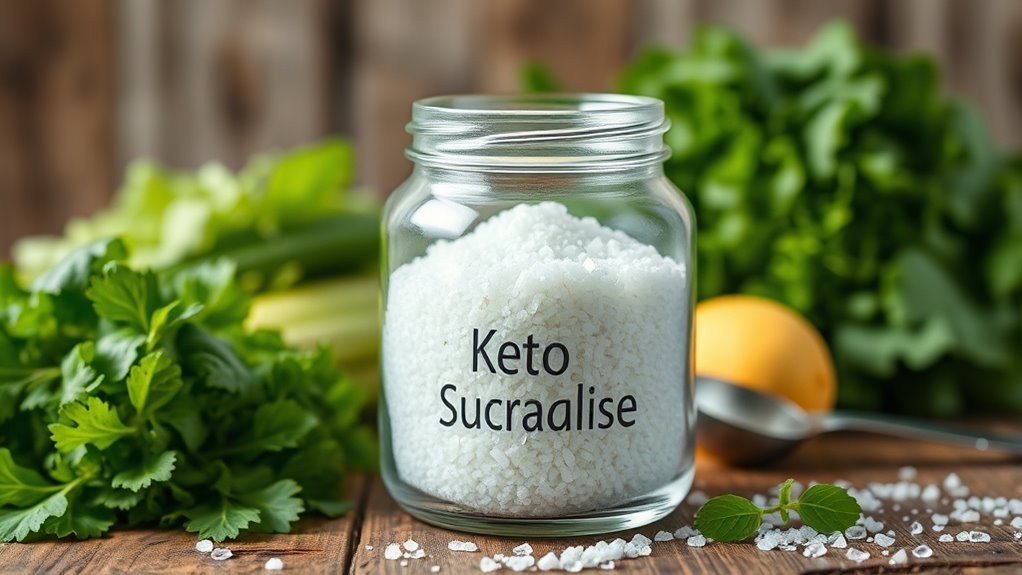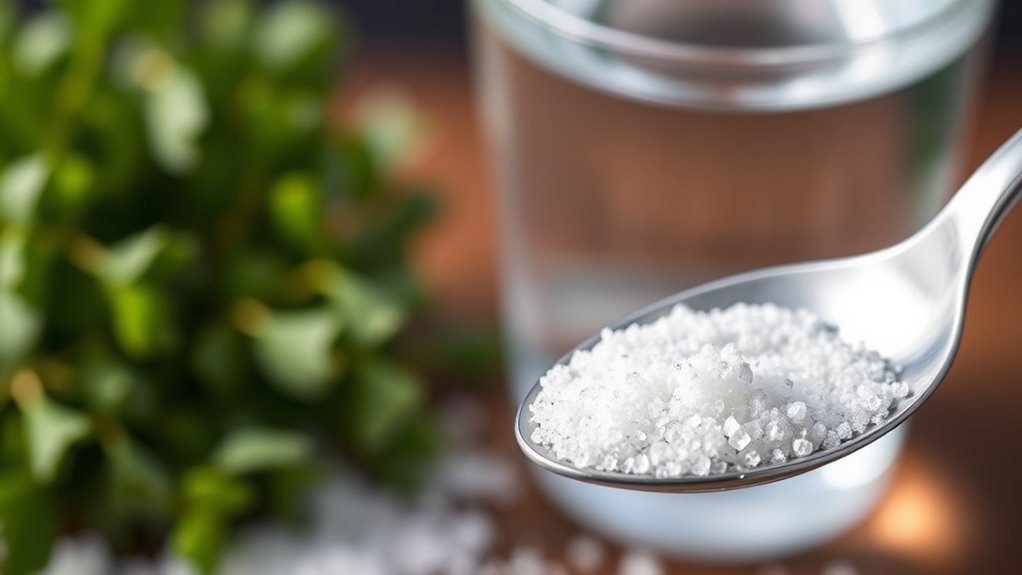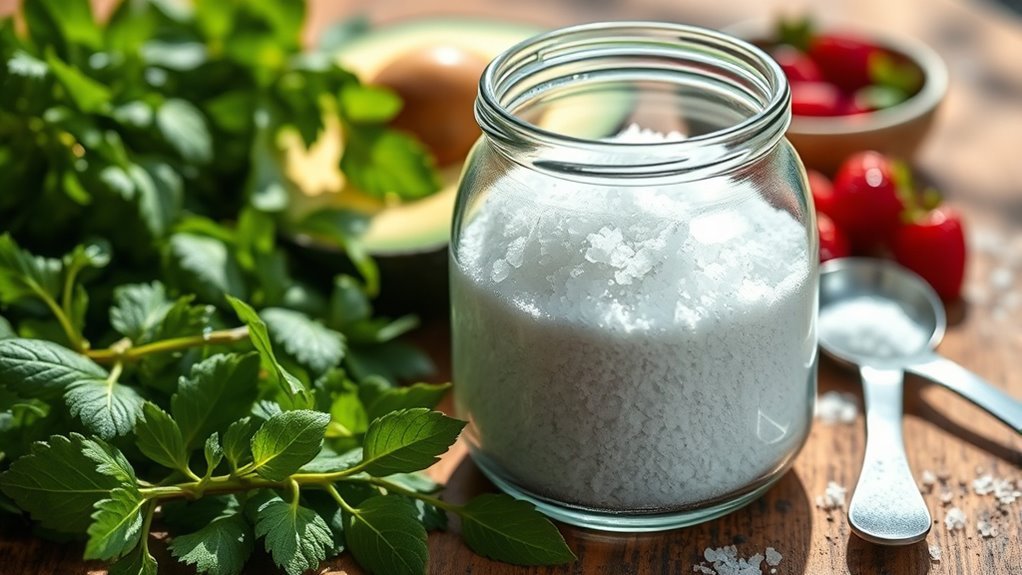Yes, you can have sucralose on a ketogenic diet. Sucralose is a zero-calorie sweetener that’s about 600 times sweeter than sugar, making it a popular option. It has minimal carbohydrates and doesn’t greatly affect blood sugar levels for most people, which can help maintain ketosis. However, be mindful of personal reactions and potential digestive issues. There are other factors to take into account when incorporating it into your diet, so let’s explore those further.
Understanding Sucralose: What Is It?

Sucralose, a popular artificial sweetener, is derived from sugar through a process that alters its chemical structure, making it considerably sweeter—about 600 times sweeter than sucrose—while containing no calories. You might appreciate sucralose’s unique taste profile, which mimics the sweetness of sugar without the guilt of added calories. The production methods involve chlorination of sugar, which results in a substance that’s stable at high temperatures, ideal for cooking and baking. This stability, paired with its intense sweetness, makes it a favorite for those seeking sugar alternatives. While sucralose can enhance the flavor of foods and beverages, it’s essential to evaluate its long-term effects on health and how it fits into your lifestyle choices.
The Role of Sweeteners in a Ketogenic Diet

When you’re following a ketogenic diet, the role of sweeteners becomes vital, especially if you’re craving something sweet without affecting your carbohydrate intake. Sweetener alternatives like stevia, erythritol, and monk fruit can satisfy your taste preferences while keeping you within your carb limits. These options allow you to enjoy desserts and beverages without the guilt or the sugar spikes associated with traditional sweeteners. However, not all sweeteners are created equal; some may impact your blood sugar or cause digestive issues. It’s important to experiment with various alternatives to find what works for you. By choosing the right sweeteners, you can maintain your keto lifestyle while enjoying the flavors you love, ultimately embracing your freedom to indulge smartly. Additionally, while Splenda is a popular choice among those on a keto diet, it’s essential to consider its potential effects on insulin sensitivity and individual responses.
Is Sucralose Keto-Friendly?

When considering if sucralose is keto-friendly, it’s important to look at its carbohydrate content and how it might affect your state of ketosis. Some studies suggest that sucralose doesn’t greatly impact blood sugar levels, but individual responses can vary. Additionally, there are health considerations to keep in mind when incorporating artificial sweeteners into your diet. Moderation and personal responses to artificial ingredients are key factors in determining how sucralose fits within your keto lifestyle.
Carbohydrate Content Explained
Although many people on a ketogenic diet are cautious about their carbohydrate intake, sucralose stands out as a popular sugar substitute that contains minimal carbs. When you’re carb counting, it’s important to choose sweeteners wisely. Sucralose is virtually calorie-free and has no significant impact on your carb count, making it a go-to option for many keto enthusiasts. Unlike traditional sugar, which can derail your ketogenic efforts, this artificial sweetener allows you to satisfy your sweet tooth without guilt. It also provides versatility in recipes, whether you’re baking or sweetening drinks. While it’s essential to remain mindful of overall consumption, sucralose can fit comfortably within your keto lifestyle, giving you the freedom to enjoy sweetness without compromising your goals. Additionally, zero glycemic impact makes sucralose a favorable choice for those managing their blood sugar levels.
Impact on Ketosis
While many sweeteners can potentially disrupt ketosis, sucralose remains a popular choice among those following a ketogenic diet. Its unique sucralose metabolism means it’s not metabolized for energy, making it unlikely to kick you out of ketosis. Research suggests that sucralose doesn’t spike insulin levels noticeably, which is essential for maintaining your keto state. This makes it a versatile option for sweetening foods and beverages without adding carbs. However, individual responses can vary, so it’s wise to monitor how your body reacts. Ultimately, if you’re looking for a sweetener that aligns with your keto lifestyle, sucralose might just be a fitting choice, enabling you to enjoy your favorite flavors without compromising your goals.
Health Considerations Overview
Understanding the health factors surrounding sucralose is important for anyone following a ketogenic diet. While sucralose is a popular zero-calorie sweetener, its impact on health is debated. Some studies suggest it may not greatly affect insulin levels or ketosis, making it a viable option for keto enthusiasts. However, it’s crucial to take into account potential downsides, such as digestive issues for some individuals. Additionally, moderation is key when consuming any sweetener to prevent potential downsides that could arise from overconsumption. You might also want to explore other sweetener alternatives, like stevia or erythritol, which have their own health benefits. Ultimately, moderation is key. If you enjoy sucralose and it fits your dietary preferences, feel free to include it. Just stay mindful of how your body responds to confirm it aligns with your health goals on keto.
Effects of Sucralose on Ketosis
When considering sucralose on a keto diet, it is crucial to understand its potential effects on blood sugar and insulin levels. Some studies suggest that while sucralose may not notably impact blood glucose, individual responses can vary. Maintaining ketosis involves various factors, and knowing how artificial sweeteners like sucralose fit into your diet can help you stay on track.
Impact on Blood Sugar
Although sucralose is often marketed as a zero-calorie sweetener, its impact on blood sugar levels and overall ketosis can be more complex than it seems. While some studies suggest it doesn’t greatly affect blood sugar regulation, individual responses can vary. For those on a keto diet, maintaining stable blood sugar is vital for staying in ketosis. Sucralose may not spike insulin levels as much as sugar, but it could still influence insulin sensitivity in some individuals. This means you should pay attention to how your body reacts to it. If you find that sucralose disrupts your blood sugar balance, it might be wise to explore other low-carb sweeteners that align better with your keto goals. Your freedom to choose should come with awareness.
Insulin Response Considerations
The relationship between sucralose and insulin response is an important consideration for those on a keto diet. While sucralose doesn’t notably raise blood sugar, its effects on insulin sensitivity and metabolic effects can vary. Here are some key points to ponder:
- Some studies suggest sucralose may lead to a mild insulin response, which could hinder ketosis.
- Individual responses to sweeteners differ, so you might experience varying effects.
- Monitoring your body’s reaction is essential for maintaining ideal insulin sensitivity.
Ultimately, if you choose to use sucralose, pay attention to how it influences your overall metabolic state. Staying informed can help you balance enjoyment and your keto goals, allowing for a sense of freedom in your dietary choices.
Ketosis Maintenance Factors
Understanding how sucralose affects ketosis is vital for anyone aiming to maintain a ketogenic lifestyle. While sucralose is a non-caloric sweetener, research suggests it might influence insulin levels, albeit minimally. For those on the keto diet, keeping insulin low is essential for maintaining ketosis. Some individuals report cravings or digestive issues when consuming sucralose, which could lead to unintentional carb intake. Still, studies show that sucralose doesn’t considerably impact blood glucose or ketone levels for most people. As a result, if you enjoy it in moderation, it might not derail your efforts. Additionally, it’s important to remember that artificial sweeteners can vary in their effects on different individuals. Ultimately, listening to your body and monitoring your response is key to successfully maintaining ketosis while enjoying the occasional sweet treat.
Comparing Sucralose to Other Sweeteners
When you’re on a keto diet, choosing the right sweetener can considerably impact your success, especially if you’re considering sucralose. While sucralose can be a convenient option, it’s important to explore sucralose alternatives to find what fits your lifestyle best. Here are some popular sweetener comparisons:
- Stevia: A natural sweetener with no calories, often praised for its health benefits.
- Erythritol: A sugar alcohol that offers a similar taste to sugar with minimal carbs.
- Monk Fruit: Another natural option, zero-calorie and low-carb, with a unique flavor.
Each sweetener has its pros and cons, so weigh your options carefully. Ultimately, the right choice will depend on your taste preferences and how it fits into your keto journey. Additionally, it’s essential to consider how carbohydrate reduction impacts your ability to maintain ketosis while using sweeteners.
Potential Health Concerns of Sucralose
Although sucralose is often seen as a safe alternative to sugar, it’s important to contemplate potential health concerns associated with its consumption. Some studies suggest that long-term use may lead to health risks, including digestive issues and altered gut microbiota. Here’s a quick overview of these concerns:
| Health Concern | Description | Research Findings |
|---|---|---|
| Digestive Issues | Can cause bloating, gas, or diarrhea | Some users report gastrointestinal discomfort |
| Gut Microbiota Impact | May alter beneficial gut bacteria | Research indicates potential negative changes |
| Insulin Response | Could affect insulin sensitivity | Mixed results in various studies |
| Long-term Safety | Insufficient data on prolonged consumption | More research is needed for conclusive evidence |
Being informed empowers you to make the best choices regarding sucralose on your keto journey.
Tips for Using Sucralose on Keto
Maneuvering the keto diet can be challenging, especially when it comes to sweeteners. If you’re considering sucralose usage, here are some tips to keep in mind:
- Start small: Use sucralose sparingly in your keto recipes to gauge how your body reacts.
- Check labels: Look for products with minimal carbs and no hidden sugars, ensuring they align with your keto goals.
- Combine wisely: Pair sucralose with other keto-friendly ingredients to enhance flavors without compromising your diet.
Frequently Asked Questions
Can Sucralose Spike Insulin Levels on a Keto Diet?
Sucralose generally doesn’t spike insulin levels considerably, making it a popular choice among keto sweeteners. However, individual responses can vary, so it’s essential to monitor your insulin sensitivity. Some studies suggest that while it may not directly affect insulin, certain sweeteners can influence cravings or appetite, potentially impacting your diet. If you’re aiming for keto success, consider how your body reacts to sucralose and adjust accordingly for best results.
Is There a Maximum Amount of Sucralose I Can Consume?
You can consume sucralose within keto guidelines, but moderation’s key—think of it like balancing a checkbook. The FDA suggests you can safely intake up to 5 mg per kg of body weight daily, but individual responses vary. Keep your sucralose consumption reasonable to avoid potential digestive issues or cravings. It’s best to monitor how it affects your body while enjoying the freedom to indulge in your favorite low-carb treats.
Can Sucralose Affect Weight Loss on Keto?
Sucralose generally doesn’t hinder weight loss for most people on keto. Its metabolism is quite different from sugar, as it passes through your body without being absorbed. However, individual responses can vary. Some might find that artificial sweeteners trigger cravings or affect insulin levels, potentially impacting weight loss. It’s essential to monitor how your body reacts and adjust your intake accordingly to maintain that freedom in your dietary choices.
Does Sucralose Have Any Calories or Carbs?
Sucralose has zero calories and negligible carbs, making it an attractive option for those watching their intake. Curiously, studies show that sucralose is about 600 times sweeter than sugar! When considering sweetener comparisons, sucralose’s metabolism doesn’t involve insulin spikes, unlike some alternatives. This means you can enjoy sweetness without the added calories or carb load. It’s a great choice for those seeking freedom in their dietary preferences while maintaining low-carb goals.
Are There Any Natural Alternatives to Sucralose?
Yes, there are natural alternatives to sucralose. Options like stevia, monk fruit, and erythritol are popular natural sweeteners that offer health benefits, including lower calorie counts and minimal impact on blood sugar levels. They’re often considered healthier choices, especially for those looking to avoid artificial ingredients. You can experiment with these sweeteners to find the right balance for your taste preferences while enjoying the freedom of flavorful options in your diet.
References
- https://www.ncbi.nlm.nih.gov/pmc/articles/PMC6472114/
- https://www.healthline.com/nutrition/sucralose-keto
- https://www.washingtonpost.com/food/2020/02/12/sucralose-keto/
- https://www.wisewell.com/blogs/blog/can-you-have-sucralose-on-keto
- https://www.cdc.gov/nutrition/data-statistics/know-your-limit-for-added-sugars.html
- https://www.mayoclinic.org/healthy-lifestyle/nutrition-and-healthy-eating/expert-answers/sucralose/faq-20058273
- https://www.nutrition.gov/
- https://www.sciencedirect.com/science/article/abs/pii/S0271531717301965


